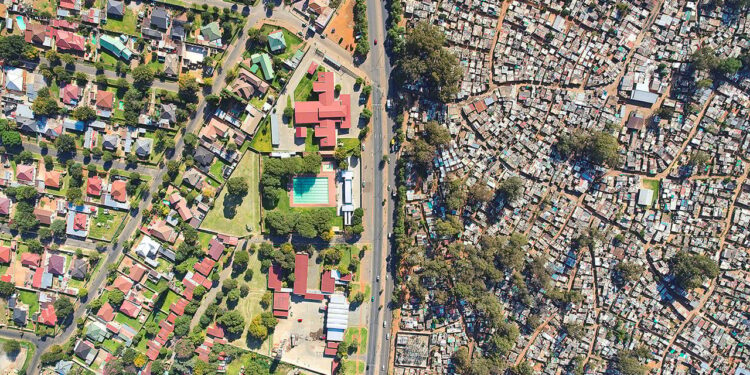Inequality: Troubling trends and why economic growth in Africa is key to reducing global disparities
Inequality remains on the top of the policy priority list for most countries in the world. Branko Milanovic, a leading scholar on inequality, recently delivered a lecture titled “Recent changes in the global income distribution and their political implications” at the University of the Witwatersrand in Johannesburg. Imraan Valodia asked him to unpack some of the main points of his lecture.
Imraan Valodia: There is a lot of discussion across the world about rising income inequality. What your lecture makes clear is that the evidence is more nuanced. Income inequality between countries has actually been falling since the 2000s, but income inequality within countries is rising. Can you elaborate on this, and outline the main factors driving these patterns of income inequality, both between and within countries?
Branko Milanovic: Yes, your summary is correct. Global inequality is the sum of inequality between countries, weighted by countries’ population, and inequality within countries. Since the 1990s, countries in Asia with relatively large populations, like China, India and Vietnam, have had high growth rates per capita – much higher than the developed countries. As a result of this, the population-weighted between-country inequality has been falling.
On the other hand, inequalities within countries have been getting much worse. These are now higher than they were 30 years ago in all major countries: the US, China, Russia, most of continental Europe, even South Africa. Only Latin America, which already was very unequal, has not followed this trend of increase of within-national inequalities.
Most of the time people don’t distinguish between these different inequalities which, as I said, have moved differently. And that creates confusion.
Imraan Valodia: You have highlighted the importance of understanding historical trends in income inequality, and how political factors shape inequality outcomes over time. What are these major historical trends, and why is it important to understand them?
Branko Milanovic: I think that the main historical trends are always reflected in income distributions or inequalities, whether we are talking of inequalities within countries or more broadly, at the global level.
At the global level, I identify three major eras.
The time of colonialism and sharp class conflict within countries during most of the 19th century and the first half of the 20th century. During that time both between-country and within-country inequalities increased. One can view between-country inequality in this case as something that made colonialism possible, or a reflection of colonialism. Both as a cause and effect.
Then during the second half of the 20th century, global inequality was extremely high and the world was divided into three “worlds”: the First (rich countries), the Second (socialist counties), and the Third (Asia, Africa and Latin America).
That changed with the rise of China, and Asia more broadly (the third era). Global inequality was reduced, but at the “cost” of rising within-national inequalities. What I mean is that globalisation might have strongly helped the growth of Asian countries, but also contributed to the increase of within-national inequalities. This is our current era. But it too might come to an end.
Imraan Valodia: Your research shows that, across the world, since the global financial crisis in 2008, the share of global income accruing to the wealthiest has not been rising. This is a change from the period before the financial crisis, as shown in your famous elephant curve, when the share of the top earners did increase sharply. But you make the point that in recent years, in money terms, the wealthiest are still increasing their incomes rapidly. Can you elaborate and explain what the difference between the relative and absolute trends means, and why it’s significant?
Branko Milanovic: Since the global financial crisis, income of the global top 1% has not returned to the growth rates they enjoyed before the crisis. This can be intuitively best understood through the example of the US, which contributes to almost one-half of the people in the global top 1%. Incomes at the very top of the US pyramid dropped during the crisis, slowly began to recover in the period after 2010, but reached their pre-crisis level only in 2018.
This means that the average growth rate over these ten years was close to zero. The second highest US percentile recovered to the pre-crisis level a bit earlier, by 2015, but the decennial average growth rate was only 1.5%. This is much below the growth rates of the top before the financial crisis.
These are relative numbers. In absolute terms, however, these very small percentage increases did translate into large absolute gains simply because the gaps in the initial-period income distribution are huge. If your income is US$1 million, even a 1% increase will mean $10,000, which is somebody else’s total annual income.
Imraan Valodia: You make the point that with the current slowdown in economic growth in China, the future pattern of global income inequality may be shaped by income trends in Africa. Why is Africa important for the future trajectory of income across the globe, and why are you pessimistic about the potential for Africa to emulate the trends that we have seen in recent years in China and India?
Branko Milanovic: China is no longer the engine of global inequality reduction that it was in the past simply because it is no longer a poor, but rather an upper-middle income country.
If global inequality is to continue on its downward trend we need new “Chinas”. One of them is obviously India, which is currently the most populous country in the world. If India continues to grow, we can expect global inequality to continue to fall.
But the others are populous African countries. This is why African economic growth is central to what happens in this century to both global poverty and global inequality.
I am pessimistic on whether African countries would be able to replicate China and India, simply based on the past: very few African countries were able to maintain high economic growth rates for a relatively long time (say, at least five or ten years in a row).
But it is an observation based on the past. We may be wrong in extrapolating it to the future.
Still the key issue of the importance of African economic growth remains. Without it, global inequality will not be reduced, and might easily increase – which would bring us to the fourth global era (to allude to my answer in the beginning of our conversation).








